| Dad Builds Our House |
Richard Lavallee Nov 2020 |
| Click photos to enlarge |
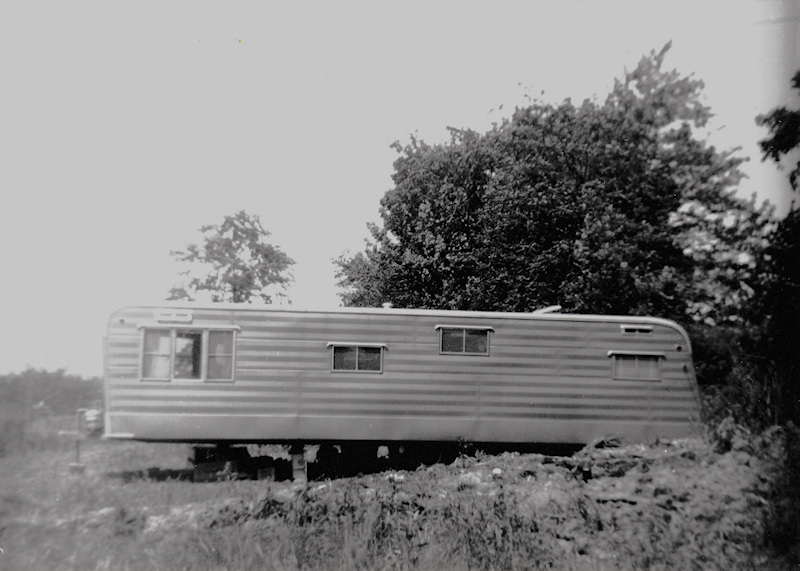 In Hurricane Hazel, I talked about moving
from our little farm in the Kingdom to Barbara Lane, where we lived in a tiny
house trailer for over a year or so until we were able to move into our new
house that my father built on the lot just down the hill from and next to the
trailer lot.
In Hurricane Hazel, I talked about moving
from our little farm in the Kingdom to Barbara Lane, where we lived in a tiny
house trailer for over a year or so until we were able to move into our new
house that my father built on the lot just down the hill from and next to the
trailer lot.
After we moved in to our trailer, a man we called "Mac" moved in kitty-corner
across from the Viau's house
just up the hill. He built a large workshed structure the size of a house
where he worked as a kind of handyman/blacksmith/equipment operator. "Mac"
was big, bearded, and burly and he smoked cigars. He resembled Bluto in the
Popeye cartoons, but I never heard him speak. We stayed away from him. He parked
all sorts of construction equipment in the yard around his big shed, which
he never painted, and which had no windows, only big garage doors.
Mac would come and go at odd times; he would disappear into the big workshop.
and we would rarely see what he was up to, although sometimes he would leave
the big garage door open when he was welding or working on something big, and
Gary and I could see his big oxy-acetylene bottles and the flames and sparks
and Mac with a welding hood on, and we would scoot by the place quickly if
we were walking home from school. We could see that he had a living space in
the back of the shed in one corner, and it had a window. Mac had a black road
grader and a bulldozer and a dump truck other rusty pieces of equipment. Everything
was old.
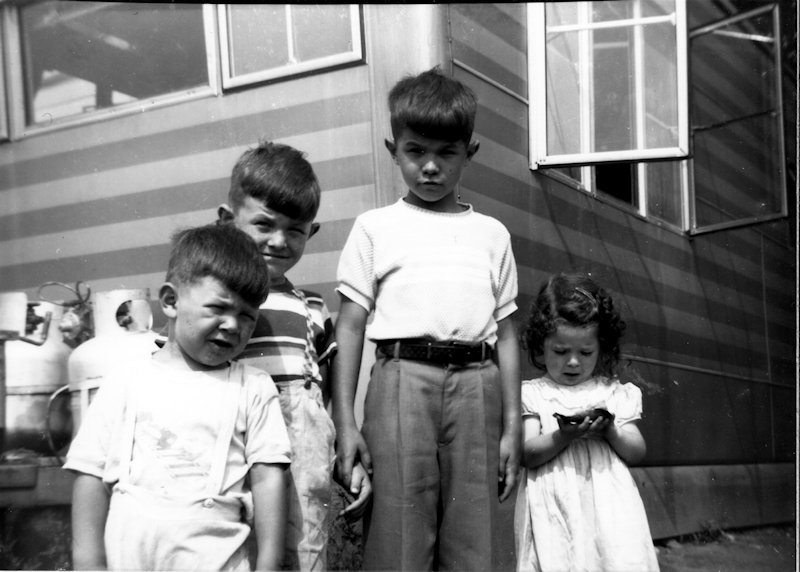 Dad hired Mac
to haul in loads of gravel and spread them out to level out the slope make a
building pad on the lot next door. Dad would build our new house on this pad.
The gravel was full of little round rocks that we would pick out of the yard
for years as each winter the frost pushed them to the top and in spring they
got sent flying by the lawn mower blades. "Picking rocks" was something
we would be sent to do if we annoyed Dad. He knew we hated it.
Dad hired Mac
to haul in loads of gravel and spread them out to level out the slope make a
building pad on the lot next door. Dad would build our new house on this pad.
The gravel was full of little round rocks that we would pick out of the yard
for years as each winter the frost pushed them to the top and in spring they
got sent flying by the lawn mower blades. "Picking rocks" was something
we would be sent to do if we annoyed Dad. He knew we hated it.
A few years later Mac would bring an old black "steam shovel" that
used cables and pulleys, and a his dump truck, and arranged with farmer Melvin
to mine gravel down the hill where there were no lots on the other side of Barbara
Lane and the farm ran right up to the dirt road. Mac dug a huge pit, but after
digging down eight feet or so hit ground water, but he kept digging as long
as the steam shovel was on dry land, eventually giving up, and leaving behind
a big treeless and weed-free gravel pit with a big pond about four feet deep.
"The Pit" and "The Pond" would become a fishing and swimming
hole and occasionally an ice skating rink, and a place to ride a mini bike,
and a killdeer nesting place, and a place for endless fun.
My sister Lorraine had been born in October 1954, two weeks after Hurricane
Hazel. My Dad added a room which we called "the annex" adjoining the
trailer to make a little more space for us. We had Thanksgiving dinner in the
annex that year, with turkey, mashed potatoes, and Hubbard squash, which I liked.
although I mixed the potatoes and the squash together, and that wasn't satisfactory
at all.
Lorraine was allergic to cow's milk, so Dad bought a
nanny goat and kept the
goat on a long chain and fed her hay and alfalfa and milked the goat in order
to feed my sister. Everything was hunky-dory.
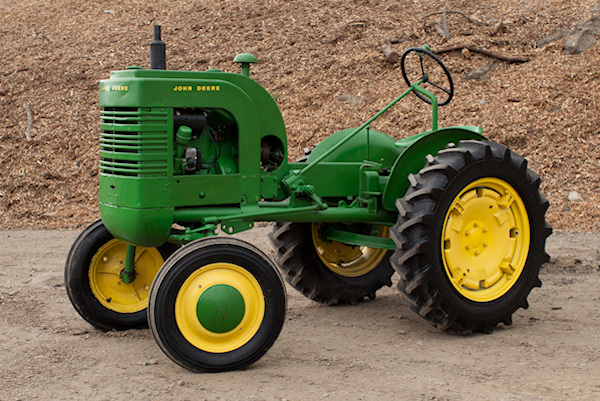 That
Christmas my brother Gary got a brand new little tractor, and I did not get
one, which caused me to pitch a fit. Apparently my parents were not aware of
my all-consuming obsession with tractors. Our little farm had been right next
to a farmer's field , and as the John Deere tractor came around to plow the
field the "Pup Pup Pup" of the tractor was the most soothing and fascinating
sound my little baby ears would ever hear. A neighbor boy had a little line-up
of red Farmall and green John Deere and gray Ford model tractors, which dazzled
me. They actually owned a little John Deere tractor, which to my young eyes
was the equivalent of the Mona Lisa. When I was four years old and still on
the farm my Dad had taken us to the New York State Fair nearby in Syracuse,
and David and I were riding on a midway ride that had swings with seats like
a bucket and leg holes suspended from arms that spun around and around, and
as we came around he handed us each a box with a brand new little tractor in
the box. But that tractor had been left behind when we moved into the trailer
That
Christmas my brother Gary got a brand new little tractor, and I did not get
one, which caused me to pitch a fit. Apparently my parents were not aware of
my all-consuming obsession with tractors. Our little farm had been right next
to a farmer's field , and as the John Deere tractor came around to plow the
field the "Pup Pup Pup" of the tractor was the most soothing and fascinating
sound my little baby ears would ever hear. A neighbor boy had a little line-up
of red Farmall and green John Deere and gray Ford model tractors, which dazzled
me. They actually owned a little John Deere tractor, which to my young eyes
was the equivalent of the Mona Lisa. When I was four years old and still on
the farm my Dad had taken us to the New York State Fair nearby in Syracuse,
and David and I were riding on a midway ride that had swings with seats like
a bucket and leg holes suspended from arms that spun around and around, and
as we came around he handed us each a box with a brand new little tractor in
the box. But that tractor had been left behind when we moved into the trailer
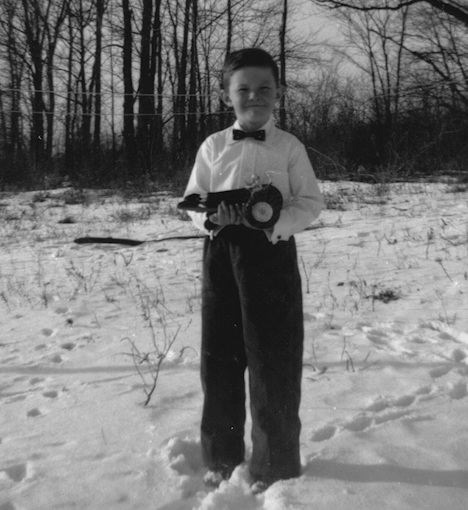 So,
in a very uncharacteristic fashion, for he was loathe to tolerate cry-babies,
my Dad somehow ran out that very day and came back with a tractor
for me, and all was hunky-dory once again. My Mom had a bed covering with
rows of little tufts on it, which I pretended were cabbages, and I would drive
my little tractor up and down the cabbage rows. I wanted to be a farmer when
I grew up.
So,
in a very uncharacteristic fashion, for he was loathe to tolerate cry-babies,
my Dad somehow ran out that very day and came back with a tractor
for me, and all was hunky-dory once again. My Mom had a bed covering with
rows of little tufts on it, which I pretended were cabbages, and I would drive
my little tractor up and down the cabbage rows. I wanted to be a farmer when
I grew up.
That spring our nanny goat not only gave
us milk for my sister, but the goat also performed the service of eating the
weeds in the yard that grew waist-high in summer. One morning we woke up and
the nanny goat was trailing behind her a long sinewy and bloody cord of afterbirth.
She had given birth in the night to two baby kid goats, a male and a female.
Now my sister would share her milk with the two baby kid goats. Our new neighbors
happily came by to see the new baby goats, but what no one realized as that
in amongst the weeds was a patch of poison ivy. Everyone got it. My Mom got
poison ivy so bad it was all up and down her legs, and poor Mom's legs were
raw from scratching. Something had to be done.
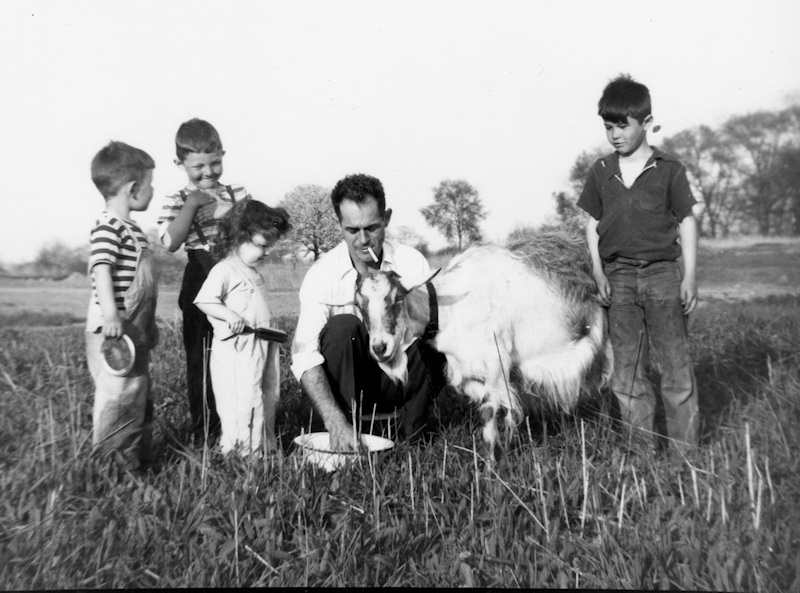 So
that night after Dad got home from work he put me in the car and we drove far
out into the country, on a road with big trees on either side. A full moon was
out that night, and as we drove along the road the moon appeared and disappeared
behind the trees as it lit up our way. Dad said that we were on our way to an
old lady's house to get some Witch Hazel for my Mom's poison ivy. To my six-year-old
mind, we were going to see a witch, but I was not afraid, I was fascinated,
because I was with Dad. Eventually Mom's poison ivy went away, and the nanny
goat ate it all up. but it still persisted at the edge of the woods where I
would play and get poison ivy on my hands for a few years until I learned to
stay away from the three shiny deep green leaves.
So
that night after Dad got home from work he put me in the car and we drove far
out into the country, on a road with big trees on either side. A full moon was
out that night, and as we drove along the road the moon appeared and disappeared
behind the trees as it lit up our way. Dad said that we were on our way to an
old lady's house to get some Witch Hazel for my Mom's poison ivy. To my six-year-old
mind, we were going to see a witch, but I was not afraid, I was fascinated,
because I was with Dad. Eventually Mom's poison ivy went away, and the nanny
goat ate it all up. but it still persisted at the edge of the woods where I
would play and get poison ivy on my hands for a few years until I learned to
stay away from the three shiny deep green leaves.
The baby nanny goat kid was sold to a family somewhere and we never saw her
again, but the male billy goat was sold to out next door neighbors, the Ford's,
and for years was only good for eating the weeds down as he was kept on a chain
and moved about in their yard. . He grew up to have big curved horns, and he
was smelly, and one time he broke loose of the chain and chased us kids to climb
up on top of my Dad's brand new 1957 Studebaker, which caused my Dad in exasperation
to refrain from completely freaking out.
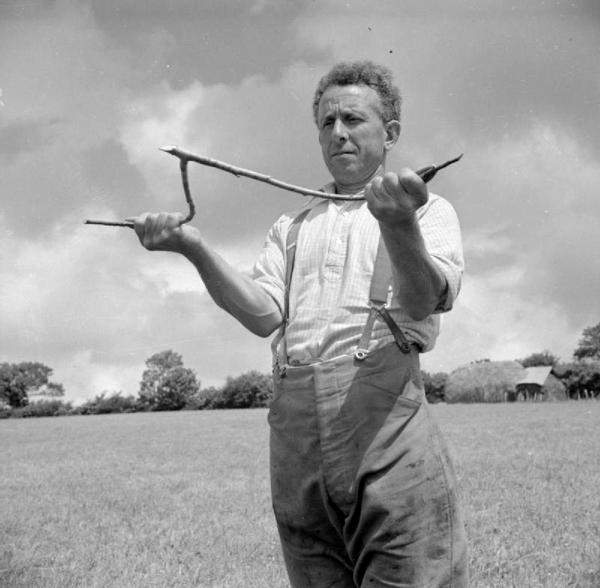 That
summer Dad would build our house. I remember the cobalt-blue blueprints laid
out on a piece of plywood on two saw horses. Dad dug a new well near where the
house would be. He found the spot he picked by fashioning a divining rod from
a slender set of Y-shaped willow branches joined at a crotch Holding a branch
in each fist, with his pinky finger side turned away from him, he twisted the
branches outward, and he pointed the crotch of the branch in front of him as
he walked around. The twisting of the branches made the crotch end unstable,
and as he walked over the water place the crotch end dipped downward pointing
to water. That was the idea, anyway
That
summer Dad would build our house. I remember the cobalt-blue blueprints laid
out on a piece of plywood on two saw horses. Dad dug a new well near where the
house would be. He found the spot he picked by fashioning a divining rod from
a slender set of Y-shaped willow branches joined at a crotch Holding a branch
in each fist, with his pinky finger side turned away from him, he twisted the
branches outward, and he pointed the crotch of the branch in front of him as
he walked around. The twisting of the branches made the crotch end unstable,
and as he walked over the water place the crotch end dipped downward pointing
to water. That was the idea, anyway
The reality was that Dad could have dug anywhere and hit water within a few
feet. The big hill we lived on is a giant mound of gravel left behind by the
glaciers of the last Ice Age. Each year the melting snow and rain seeps down
into the earth. There was a big swamp and the far end of our property with a
"crick" where a spring emerged to run down an old ditch dug on the
property line by the adjoining farmer, that ran down all the way to the Seneca
River a quarter mile away. In some places near us you could hear the water running
in underground streams below the surface. There was a second "crick"
along our southern property line in a similar ditch. So Dad and David dug a
big hole about 6 feet deep or so to put the pump to supply the house. Farther
away and down stream of the underground water he put the septic tank.
Dad built the foundation of concrete blocks and mortar, and built the subfloor,
and then the walls of the same concrete blocks. One of the neighbors, Mr. Taillefer.
newly arrived like the Viaus from Canada, was an experienced mason, and he laid
blocks quickly. Dad put me to work with a hoe and a wheelbarrow keeping the
mortar turned over so it didn't set up. Mr. and Mrs. Taillefer, daughter Francine
and son Dennis (the menace). would move in to our trailer after we moved in
to the new house, and they lived there for years, after which a childless couple,
Mr. and Mrs. Manwarren bought the place.
Along with Mr. Taillefer, other neighbors lent a hand as well, and Dad paid
them for their work. My uncles, Dad's brothers Gil and Gabe also came out. They
had to work quickly because the house had to be finished before winter, and
so they did. Dad built a wood frame inside the concrete walls, so the finished
house would have extra thick walls that made it very snug in the bitter cold
winters. When the roof rafters and sheathing were ready, My brother David andmy
uncles quickly nailed on the singles. Dad put the kitchen on the south side
of the house where it would be warmer, with sunny windows for Mom on the south
and east The kitchen had walls of varnished knotty pine that provided endless
imaginings of various exotic animal faces. The living room adjacent to the kitchen
had a big double-paned "picture window" and on one entire wall Dad
put a wallpaper mural - a photograph of the Mojave desert mountains and sand
dunes in the foreground that had not a blade of grass. It was exotic and wonderful
to look at and reminded Mom and Dad of their time in Arizona. The front door,
which was never used except for company, had three little windows arranged diagonally,
which was a popular style at the time
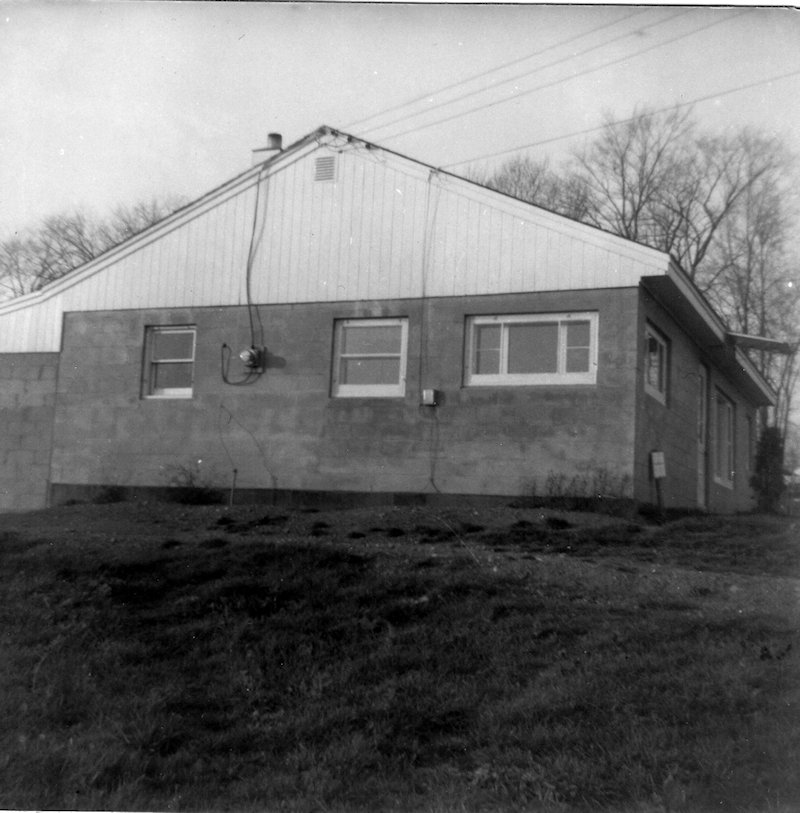 One
bedroom each for the boys and the girls on the north end of the house. Dad never
got around to putting a door on the closet that opened to each side to be shared
by the boys and the girls. The bedrooms were big enough for a bed and a dresser
and not much else. Early on I swatted the wall lamp and the globe fell off and
broke, and it was never replaced. The pull chain on the lamp soon broke off,
so from then on for many years the lamp was operated by twisting the light bulb
in and out.
One
bedroom each for the boys and the girls on the north end of the house. Dad never
got around to putting a door on the closet that opened to each side to be shared
by the boys and the girls. The bedrooms were big enough for a bed and a dresser
and not much else. Early on I swatted the wall lamp and the globe fell off and
broke, and it was never replaced. The pull chain on the lamp soon broke off,
so from then on for many years the lamp was operated by twisting the light bulb
in and out.
The house was 800 square feet. It had a utility room where the oil furnace
and the water pump and the washing machine were kept, and the water piping and
the wood studs were exposed. There were boards nailed to the studs like a ladder
up to the attic where I would sneak through the hatch and try to peek at Christmas
presents or hide from my Mom. . It was the warmest room in the house, and on
really cold days I would snuggle up on the floor in front of the furnace where
the hot air traveled under the floor along the space between the floor joists
to come up through the registers in the floor in the various rooms. Next to
the utility room was the bathroom, and then Mom and Dad's room, and then the
girl's room.
Dad added a back room for the oil tank and tools and later on a covered porch
with window walls which was intended to be a sun room but wound up being storage
space. It was there that I would find the trunk full of Dad's keepsakes from
Japan, and the guitar that the Petersen's would store temporarily when they
moved, and my first motorcycle, and the storm windows, and so on.
The exterior was concrete blocks painted pink. Not very attractive, but so
it remained until I was 14 years old, at which time we had aluminum siding installed,
which greatly improved the appearance of the house. My mother gifted me the
small transistor radio that the aluminum siding company gave away as a promotion.
My most prized possession, I carried it with me constantly, and went to sleep
with the little ear speaker playing Top 40 all night.
We had a very large front and back yard. The lot was 90 feet by 140 feet. .
It took me and my brothers what seemed like hours to mow the lawn each week.
Dad stuck a willow whip in the front yard which grew into a massive weeping
willow tree with a trunk three feet in diameter. Willows love water and wet
places. In the back yard we had large gardens, and the very back along the farmer's
field for the last 25 feet or so it was swamp, with cat tails that hid the big
burn pile where we burned our garbage. On the far property line next to the
crick an old choke cherry tree grew
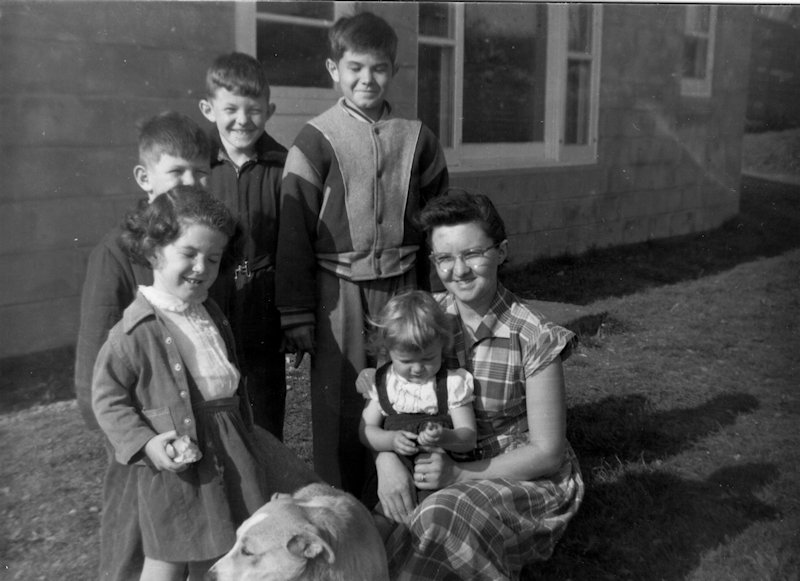 This
was the house where I would live with my brothers
and sisters until I was 18 years old and a Senior in High School. Eleanor (Mom), Bernie (Dad), David, Dicky, Gary , Marilyn, and Lorraine. It was
home, and soon Pamela, Stuart & Joanne would join us. For a while Dad rented our trailer to the Taillefer family, who later
purchased it. Other neighbors were moving in, most with trailers. Some of them
also built a house, like Dad did. Some, like our next door neighbors in either
side, never did , but lived in the trailer for the duration. Two doors down,
a family started building a house, but ran out of money, and the bare house
frame stood for many years abandoned. Once I found a robins nest with chicks
in the framing. . A couple of neighbors on the other side of Barbara Lane from
us had the house built from scratch without living in a trailer first. As time
went on there would be 13 new neighbors across and down the hill from us on
Barbara Lane, with a couple of empty lots in between some of them. These were
the families that made up our little world as I grew up. The families up the
hill from our house and the now Taillefer's trailer were in a different little
world, one with which we "down the hill" families had little interaction
- and partly because the woods uphill on one side, and Mac's place uphill on
the other side, with .a steep incline right at that spot on Barbara Lane, all
made a natural dividing line.
This
was the house where I would live with my brothers
and sisters until I was 18 years old and a Senior in High School. Eleanor (Mom), Bernie (Dad), David, Dicky, Gary , Marilyn, and Lorraine. It was
home, and soon Pamela, Stuart & Joanne would join us. For a while Dad rented our trailer to the Taillefer family, who later
purchased it. Other neighbors were moving in, most with trailers. Some of them
also built a house, like Dad did. Some, like our next door neighbors in either
side, never did , but lived in the trailer for the duration. Two doors down,
a family started building a house, but ran out of money, and the bare house
frame stood for many years abandoned. Once I found a robins nest with chicks
in the framing. . A couple of neighbors on the other side of Barbara Lane from
us had the house built from scratch without living in a trailer first. As time
went on there would be 13 new neighbors across and down the hill from us on
Barbara Lane, with a couple of empty lots in between some of them. These were
the families that made up our little world as I grew up. The families up the
hill from our house and the now Taillefer's trailer were in a different little
world, one with which we "down the hill" families had little interaction
- and partly because the woods uphill on one side, and Mac's place uphill on
the other side, with .a steep incline right at that spot on Barbara Lane, all
made a natural dividing line.
Ahead would lie all the days of childhood and growing up with upwards of twenty
boys and girls on this dead-end little universe planted between the farmer's
fields and forest, streams and river. It was the most wonderful place to grow
up that I can imagine. My Dad picked a perfect place for me, my brothers and
sisters. Except for the winters.
____________________________________________________
| Floor Plan | Map |
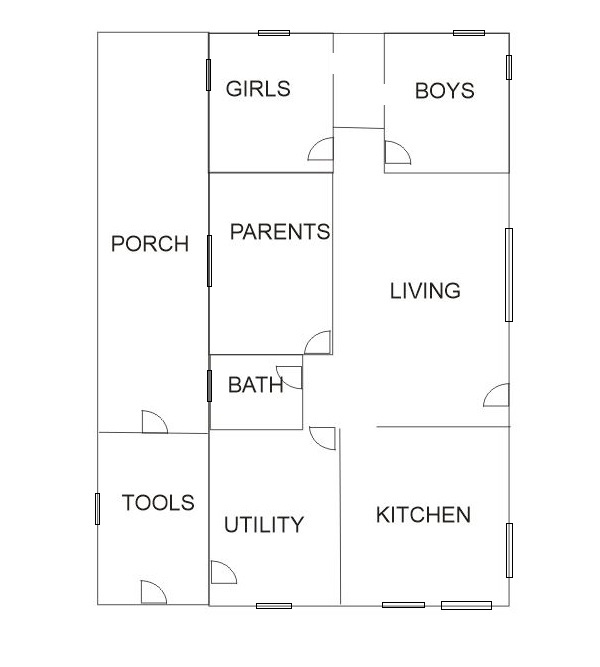 | 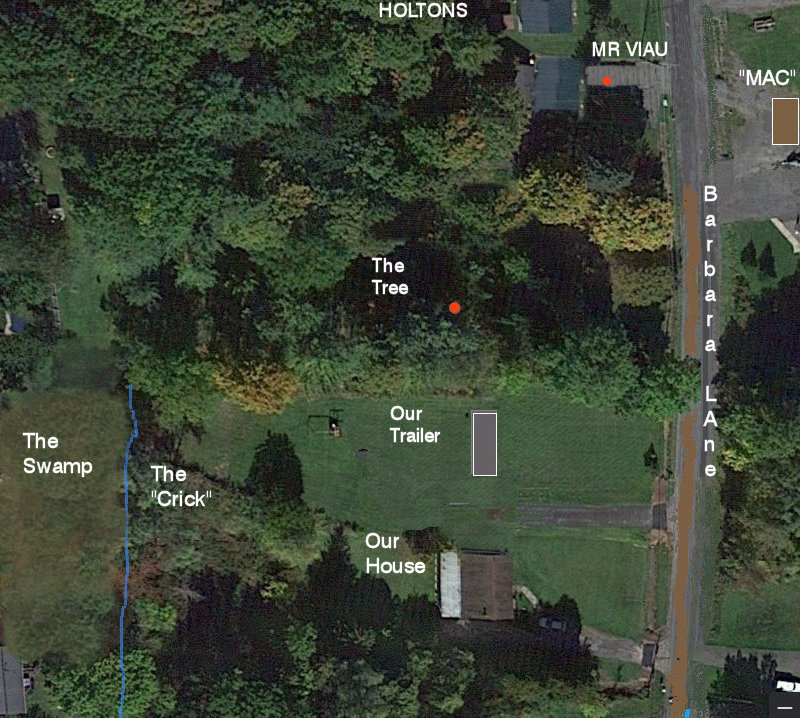 |
 In Hurricane Hazel, I talked about moving
from our little farm in the Kingdom to Barbara Lane, where we lived in a tiny
house trailer for over a year or so until we were able to move into our new
house that my father built on the lot just down the hill from and next to the
trailer lot.
In Hurricane Hazel, I talked about moving
from our little farm in the Kingdom to Barbara Lane, where we lived in a tiny
house trailer for over a year or so until we were able to move into our new
house that my father built on the lot just down the hill from and next to the
trailer lot. 







